
OR
Republica Roundtable
Call to address economic impact of coronavirus outbreak
Published On: March 17, 2020 08:23 AM NPT By: Republica | @RepublicaNepal
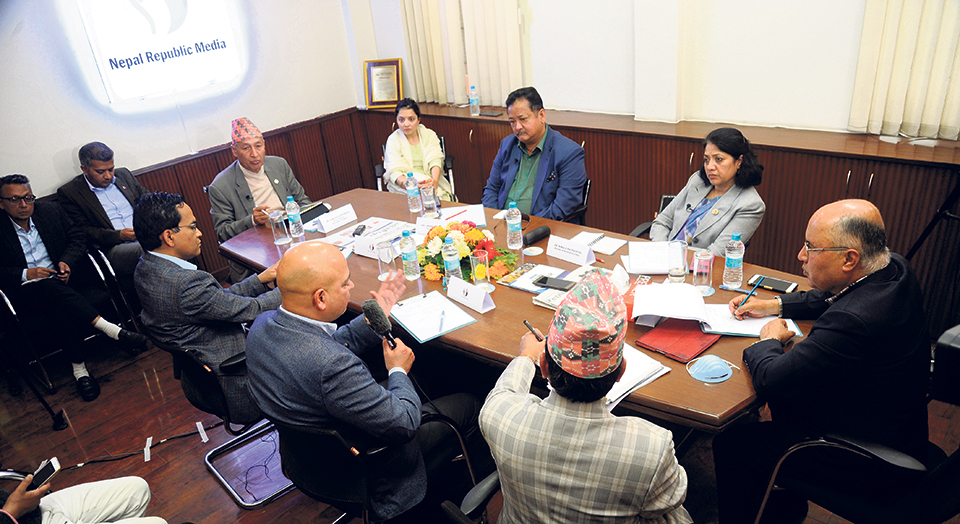
KATHMANDU, March 17: Amid prevailing threat of the coronavirus, the government has expressed some concern, if not much, to check possible spread of the disease in the country. The much focus has been towards maintaining supply of essentials including preventive health kits.
As of now, no radical measures have been taken by the government authorities to address the adverse economic impacts which various sectors are likely to sustain in the aftermath of the current situation. Nevertheless, the impact has already started to surface in number of sectors including tourism and project construction that have been employing Chinese workers. In addition, it is likely to impact remittance inflow and government revenue collection as majority of the destination countries attractive for the outbound workers have announced a lockdown while the import has also started to decline as of late.
With the heavy downfall in business, the Federation of Nepalese Chambers of Commerce and Industry (FNCCI), an umbrella organization of private sectors, has also sought a three-month extension of the deadline for filing taxes and loan repayment for businesses and firms which are due for mid-April. In the context, Republica on Monday organized a roundtable comprising representatives from government, Federal Parliament, private sector and experts to discuss on the possible economic impacts and related remedial measures to address the situation. Excerpts:
We need to consider the risk prudently
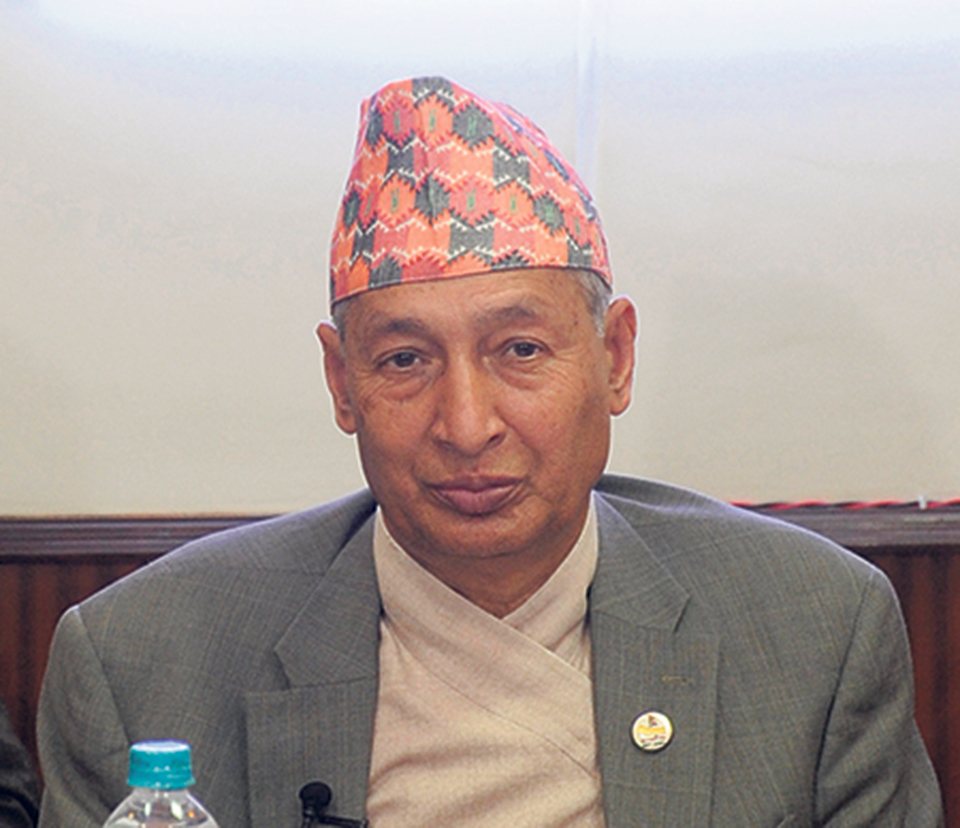
Yuba Raj Khatiwada, Minister for Finance
We should not overrate or underrate the situation, but need to consider the risk prudently. Although there is no such evidence of coronavirus affected person seen in the country, we should remain aware of the from other countries that are fighting back against the disease.
As of now, internal revenue collection is good with an increment in VAT collection by 30%, while there is a growth of 35% in income tax. These all indicate that the economic activities have not been much affected yet. However, there could be a lagged effect of this pandemic.
Some sluggishness in imports is the result of our own policy of discouraging unnecessary imports. Some development projects have seen visible impact due to coronavirus outbreak. There could be a contraction in construction sector. Manufacturing sector has not seen much impact as Nepali industries seem to have a stock of raw materials that they import from China. Still, there is a kind of 'wait and watch' mentality among investors who want to make new or additional investments in manufacturing sector.
Though banks might require rescheduling and restructuring of loans to tourism sector where their loan exposure is not so significant, they will be able to manage it in easily. There is no need to worry about the soundness of the banking system.
It's the tourism sector that was hit at first and there is also possibility that the lagged effect could remain for some time. Even if everything goes well from today, travelers have to make their holiday plan and do booking. Similarly, there should be readiness in the part of hotels. This means that we lost the tourists of this season (February-March). But, if we make early preparation, we would not lose tourists of next season. During off season, our strategy would be to attract Chinese and Indian tourists after China becomes 'coronavirus free'.
We have experience of addressing various types of shocks. During and after the decade-long conflict when tourism and other industries faced the problem, we had brought a separate policy to revive and support sick industries. We are experienced about introducing instruments to address and protect our economy from various shocks. The only question could be whether our preparation is full when the problem reaches to a level that is about to explode.
In India, the number of infected people is only around 100 a day even in the eighth or ninth day against the assumption that there will be a quantum jump. There is no risk now from northern neighbor. There is no problem from international visitors through airport as we have put in place safety measures there. We are safe from the surface border until there is a big outbreak in India. So, in this situation, we have to move in a cautious way and make preparation to deal with the possible adverse situation.
Increasing production capacity is our ongoing strategy regardless of coronavirus outbreak. We have a plan to become self-reliant in at least a dozen industrial products. This is a very good opportunity to increase production. The industrial capacity utilization has become weak to an extent. Capacity utilization of construction related industries went down due to protest of contractors over their disagreement with public procurement related regulation. Later, there could be some impact of coronavirus also.
We could consider about providing tax rebate or even subsidy to businesses and industries which have faced the impact. We are already providing subsidy to encourage exports. If export-oriented industries face adverse impact, we can review the subsidy policy. We can redefine the industries that are eligible for the subsidy and add more sectors which can benefit from the government policy. We can also revise the sectors that receive interest subsidy from banks to include industries hit by coronavirus.
The government has also directed Nepal Rastra Bank (NRB) and bankers to review the borrowers who have been affected by the coronavirus outbreak and become flexible to protect industries or businesses based on the recovery plan submitted by the borrowers.
We are also working to make sure that the income of working or labor class does not erode. So, the poverty level is not going to be adversely impacted like during the 2015 earthquakes. Still, we have to adopt protective measures cautiously.
Government needs to bring relief packages

Bimala Rai Poudel, Member of the National Assembly
The situation is alarming. Although we do not know the full impact of the coronavirus in Nepal, it has created some level of fear among all of us. Analyzing the economic impact, the coronavirus has largely affected both the chain of supply and demand. Considering the experiences of China, the country has wisely incorporated the costs of the impact of the coronavirus in their economic costs.
But in the case of our country, we could hardly sustain the overall cost by doing so. The coronavirus has hit the sector like tourism, construction, and manufacturing and to the people belonging to low income groups. People who rely on remittance spend 70% of it in consumption. After the flow of remittance decreases, it will directly hit the people belonging to that group. Instantly they need to decrease their consumption and we need to protect it. This will affect from nutrition to school and medicine, and we need to address this vulnerable situation.
People who are on wage labor working in the tourism, service sector, manufacturing and industry will have financial problems. People who directly depend on daily wages for their basic needs should be protected and provided with essential products that they require. There are two types of condition seen, currently one who depends on daily work for wage and have no savings and cannot purchase any further food and essential products to stock them up. On the other hand, another segment of people who have sufficient savings and can purchase food materials and essential in large stock, have started hoarding them. This situation also has disturbed the supply in the market. Government should work on making balanced supply in the market.
In this situation, the government should open fair trade markets where people could easily buy their essentials. Also, this market will come handy to the people who rely on day to day wages. We need to identify the measures of social security, which balances supply, to provide loan packages and subsidy to the people who really need.
Basically, it is not the coronavirus which itself impacts the economy but it is our strategy which we will adopt to control the spread of the coronavirus. We have to initiate workout to identify the vulnerable sectors to adopt strategies to control the spread of virus which impacts our economy. Our homework has been lacking to work for future safety and to take actions to prevent any casualties that may occur.
We need to protect and support the population who rely on remittance, wage labor and service sector, as these sectors have been mostly affected and there must be some sort of financial support or subsidy which will balance in their consumption. This also has given us a chance to become self-reliant and give emphasis on our own production.
We want the NRB to be liberal in loan-rescheduling

Shekhar Golchha, Senior Vice President, FNCCI
We have seen what coronavirus can do and how exponentially it has been growing. The immediate impact of the virus has been visible in tourism industry. The VNY 2020 was inaugurated with much fanfare, but hotel occupancy has fallen to a single digit. Many entrepreneurs have made huge investments in the tourism industry as a preparation for VNY campaign. But their investments are in risk. Our country has a dependent economy; all essentials have to be imported from India and other countries. If coronavirus situation worsens in India, there might be a total lockdown. It will result in the shortage of essential goods in Nepal. Though Nepal has medicine stock lasting six months, there will be immediate shortage of food in Nepal which can result to inflation. The dollar has become volatile and the transportation cost too has increased. So there is no doubt that there will be inflation in essential goods.
It is not easy to explore opportunities in this state. Unless the cost of doing business does down and our efficiency increases, realistic investment cannot be secured. There has been minimum foreign direct investment (FDI) in fields other than cement industry. There has been no significant FDI in real sectors. The main reason behind this is lack of efficiency. Also, we are not able to compete in the international market.
The cost for businesses is very high in Nepal. I have heard that the cost of electricity, especially of dedicated line, will be continued. Every country provides subsidies in different forms to industries so that they can have competitive advantage. In Nepal's case, our advantages for the future can be energy. But despite being a load shedding-free country with projected surplus energy, the industries are still charged extra for dedicated lines. If this continues, it will be hard to get FDI from China and India in real sector.
The private sector of Nepal is often accused of showing inclination over trading and not industries. What I want to say is, private sector will sway where there is viability. The viability in industries is very low, so the private sector is inclined over trading.
We want Nepal Rastra Bank (NRB) to be a little liberal if someone wants to reschedule the loans. If there is a delay in the payment of installment, we have requested levy over the interest rate implying only minimum rate. We have also put forward the demand to further strengthen refinancing. Refinancing was announced after the 2015 earthquakes. But the conditions are so strict that except few huge industries, others could not access it. We should figure out how small and medium sized industries can utilize refinancing for a short-term.
The liquidity is liberal. But considering the risks, the banks can increase interest rate. The government should fix an upper limit and continuously intervene to stop unnecessary hike in interest rate.
Additionally, except on masks, there has been no problem in supply of essential commodities in the market.
Government should not tighten taxations

Biswo Poudel, Economist
A study conducted by the multilateral organizations shows that poverty rate is reduced by almost 1.5% every year. Prior to the start of the unofficial blockade by India, the poverty rate stood at 20%, while the rate climbed to 28% in 2015.
After the blockade, the poverty rate again started to decline at 1.5% per annum. This shows that short supply creates immediate impact in the economy.
Looking at the past incidents, the COVID-19 might be a serious problem for those especially hovering just above the poverty line. But this is not an unreasonable situation. The study shows that sudden shocks are followed by a V-shaped recovery, and it doesn't have a long-term impact in the economy.
But in the context of Nepal, the response of the government plays a key role in shaping the economy at this time of global pandemic.
First, the government should not tighten taxations and loan repayment. There are some sectors like tourism which has been hit hard by the situation. The government should identify sectors that are hit by the impact of the coronavirus. Providing relief to these sectors would help to contain the poverty rate.
Second, the government can adopt a short-term mechanism to control prices as families spend their savings in the time of short shock – like coronavirus. At this time, adopting a short-term mechanism will help control increasing price and save industries from collapse.
Although Nepal is said to be a free market economy, the country is not actually a free market.
In the past, we have seen commercial banks entering into a 'gentlemen's agreement', which is also a kind of a cartel. So the authorities concerned should play a crucial role in situations like this.
Like the finance minister said, the coronavirus has not hit supply and increased prices. But, this is the scenario till now. And anything may happen tomorrow. So, it is necessary to adopt a short-term mechanism to deal with the impact of the coronavirus.
Govt should support us

Umesh Lal Shrestha, Vice President, FNCCI
I think the government still has not begun preparation to combat coronovirus outbreak. Our porous borders are still not managed. As a businessperson, I can say that people are in a panicked state. What will happen if the crisis lingers and our stock of food and medicines declines? As fiscal year-end is approaching nearer, businesspeople will have hard time meeting sales target. The government has brought a budget of Rs 1.5 trillion for the current fiscal year. Now, the government should inject the money to keep our industries running. If we don't support these industries in the time of crisis when we should do it? If coronavirus crisis persists for long, what are we going to do about it? There will be an international lockdown. What will we do about medicine and food? We need to move forward taking these aspects into consideration. Economists say that the world economy suffered losses worth nearly US$ 1.5 trillion in World War II. It is said that the loss this time would be five times higher.
The Federal Reserve Bank of the US has lowered interest rate to 0-0.25% after the announcement of coronavirus as pandemic. This kind of intervention is needed in Nepal as well. If we don't look after trade and industries sector in the current crisis, we will not feel that the state has supported us. The government should look after the sector that has been hit hard.
About five years ago, I had opened a company that produces products like hand sanitizers. But I had to shut down the company after one and half years of operation due to customs policy of the government. The government charges 20% duty on both raw materials and finished goods. Such policies won't let us become self-reliant. This is the right time to work toward becoming self reliant. If we become self-reliant in certain fields, we won't have to rely on other countries for the supply to Nepal.
You May Like This
-1200x560-wm_20240503161056.jpg)
Flight operations again halted at PRIA on Friday
POKHARA, May 3: Flight operations at the Pokhara Regional International Airport (PRIA) have been halted once again. Despite resuming on... Read More...

Gold price decreases by Rs 1,100 per tola
KATHMANDU, May 3: The price of gold has decreased by Rs 1,100 per tola in the domestic market on Friday. Read More...
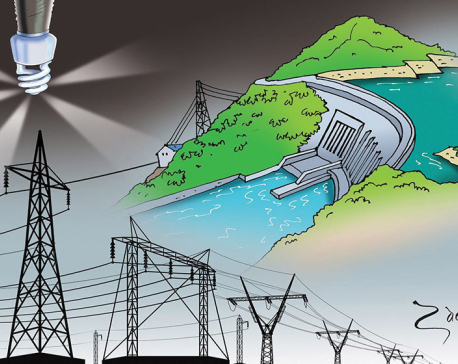
Nepal will need an investment of Rs 6.1 trillion to produce 28,500 MW of electricity by 2035
KATHMANDU, May 3: The government has set a target of producing about 28,500 megawatts of electricity in the country within... Read More...

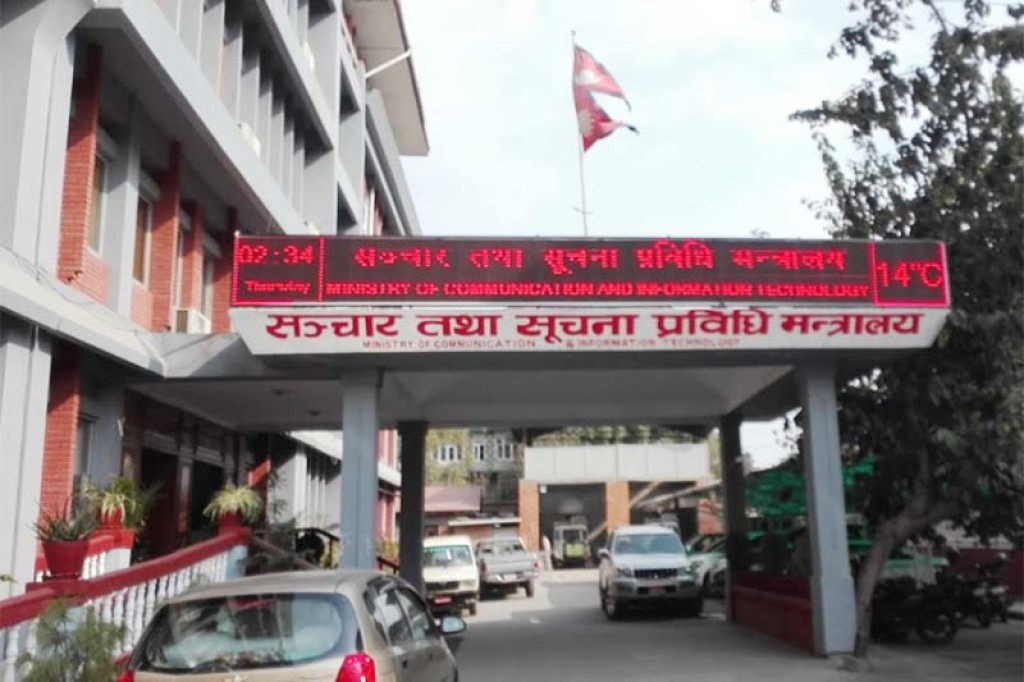


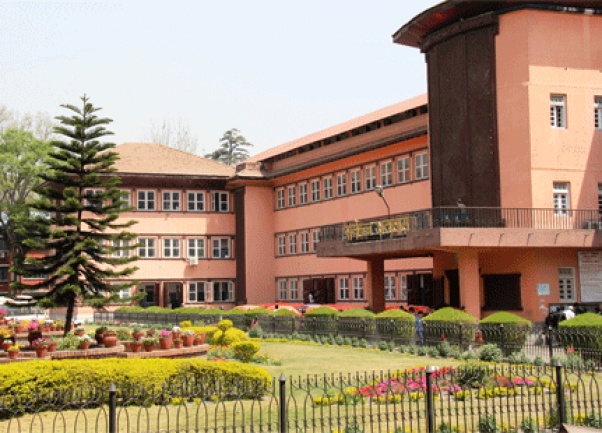
-1200x560-wm_20240503161056.jpg)
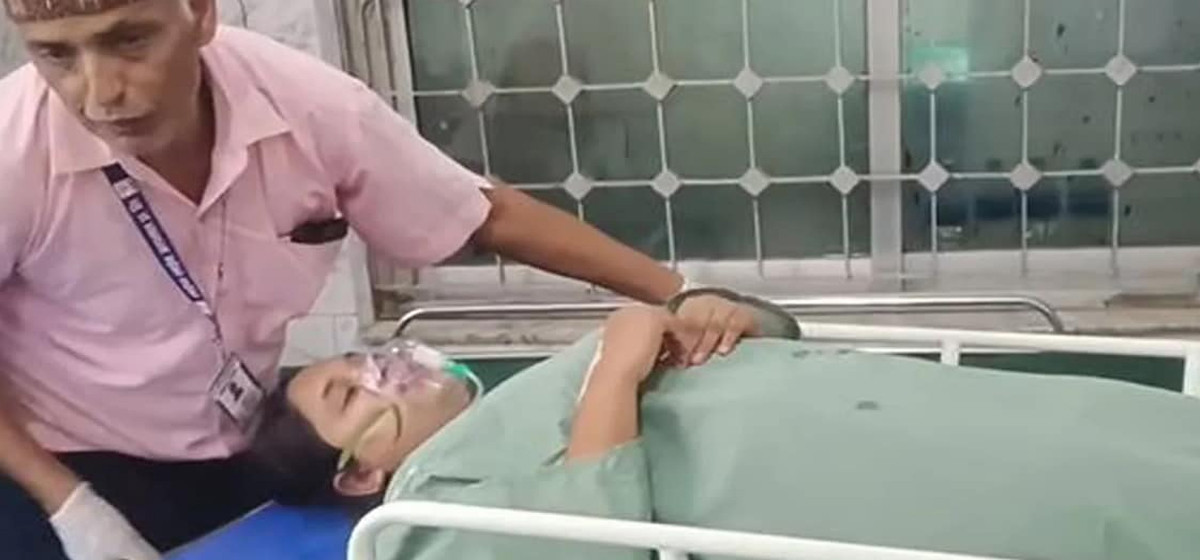


Just In
- Flight operations again halted at PRIA on Friday
- Student attacked while returning from Grade 12 exam in Jhapa
- Red Cross instructs district branches and agencies to adopt integrated accounting system
- RSP calls Secretariat meeting to review by-elections
- Bharatpur metropolis urges businessmen to stop mixing wastewater in sewers
- Gandaki CM to seek trust vote on May 5
- Two arrested on the charge of swindling 219 people out of Rs 26.8 million on the pretext of sending them to Japan
- Kathmandu's pollution at hazardous level, tops chart of world’s most polluted cities



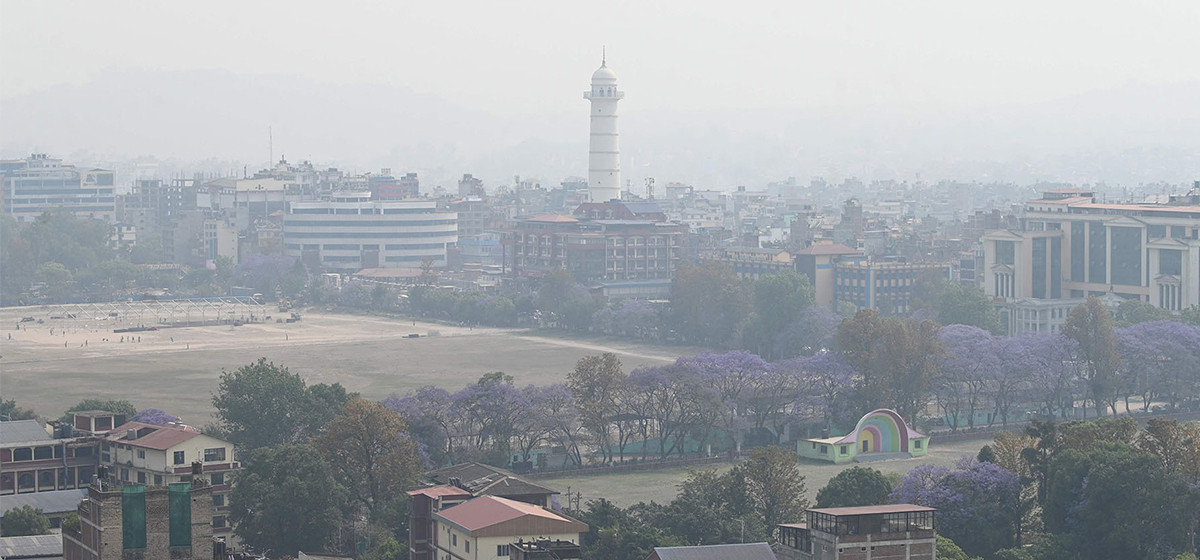
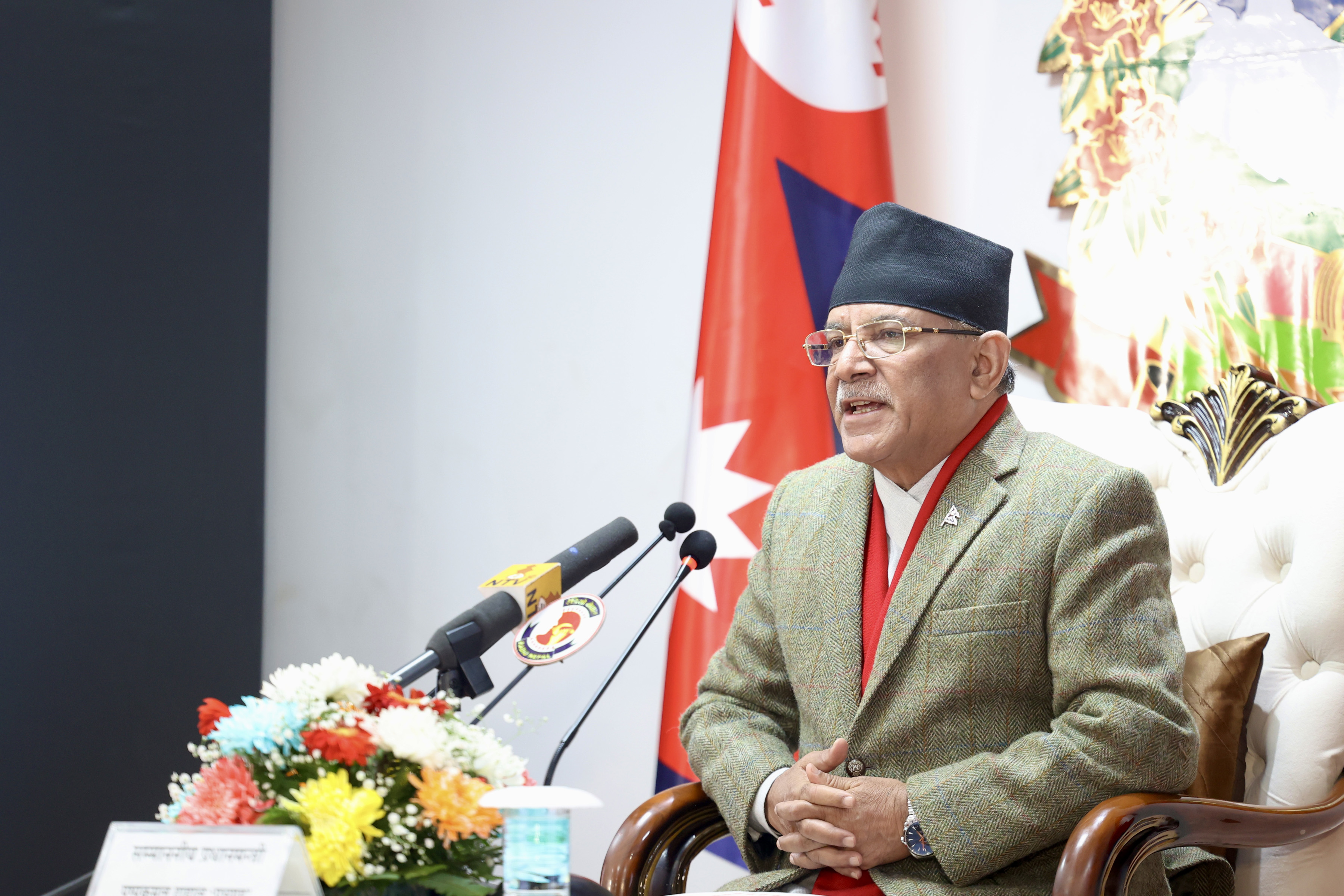

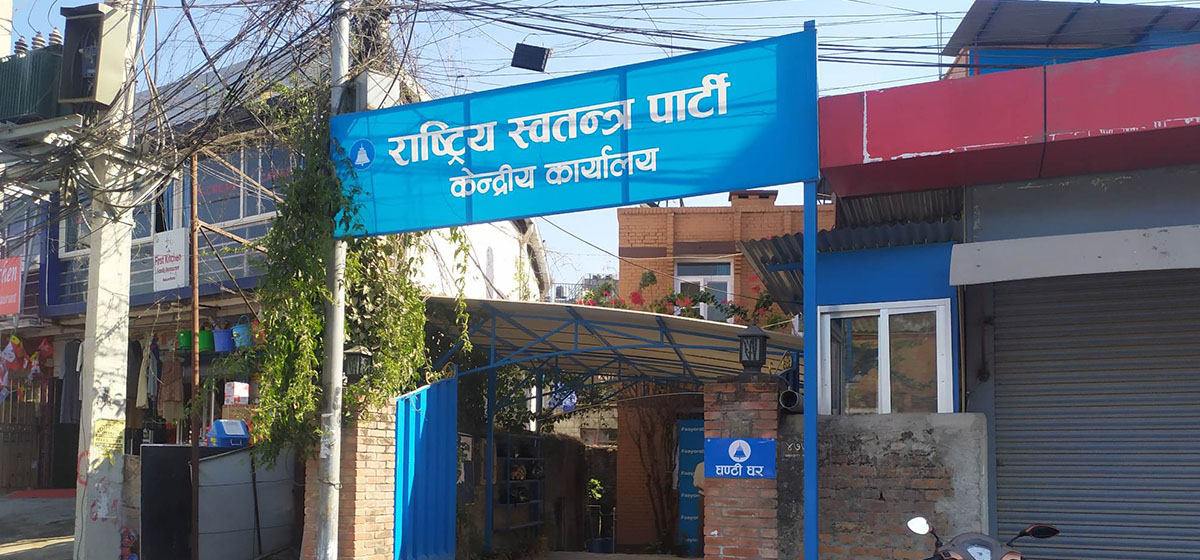
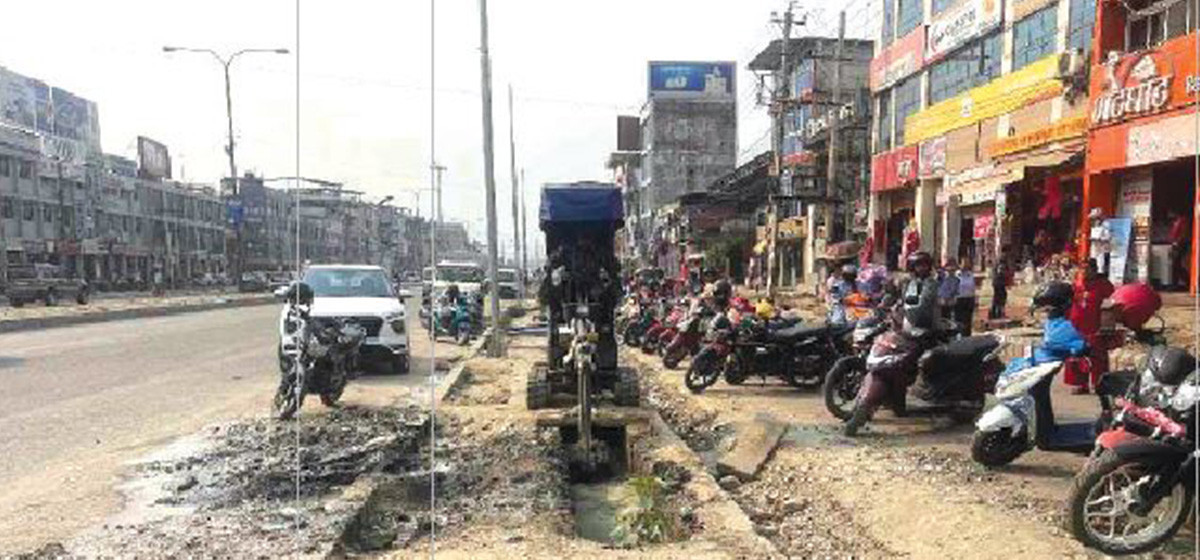

Leave A Comment